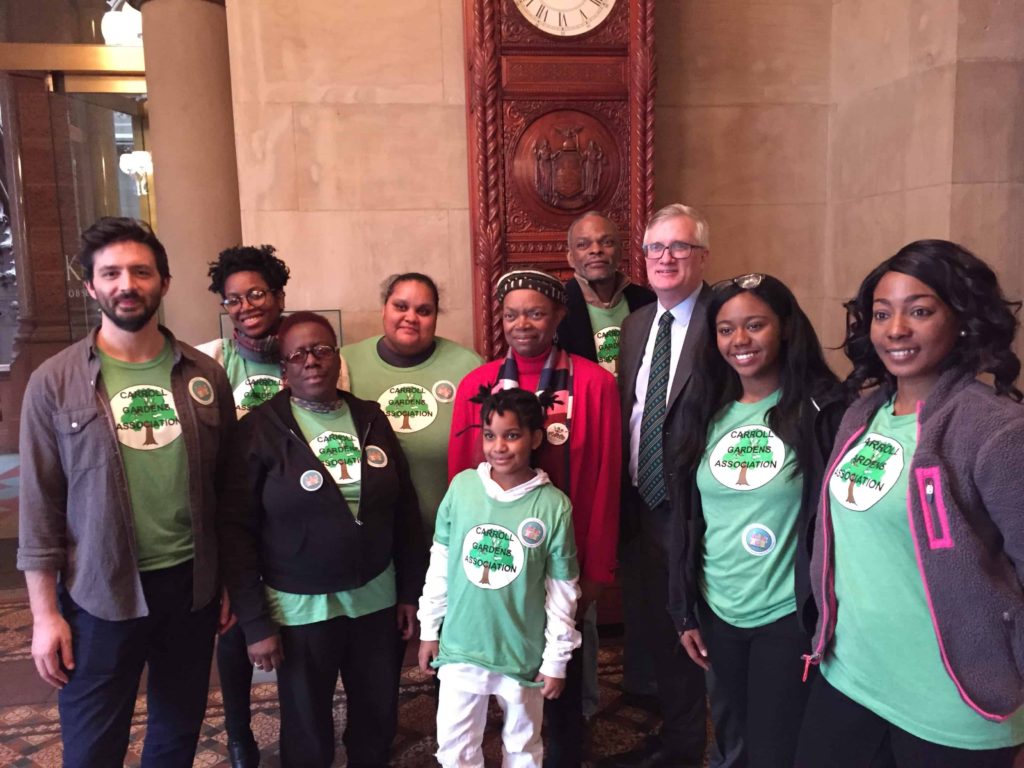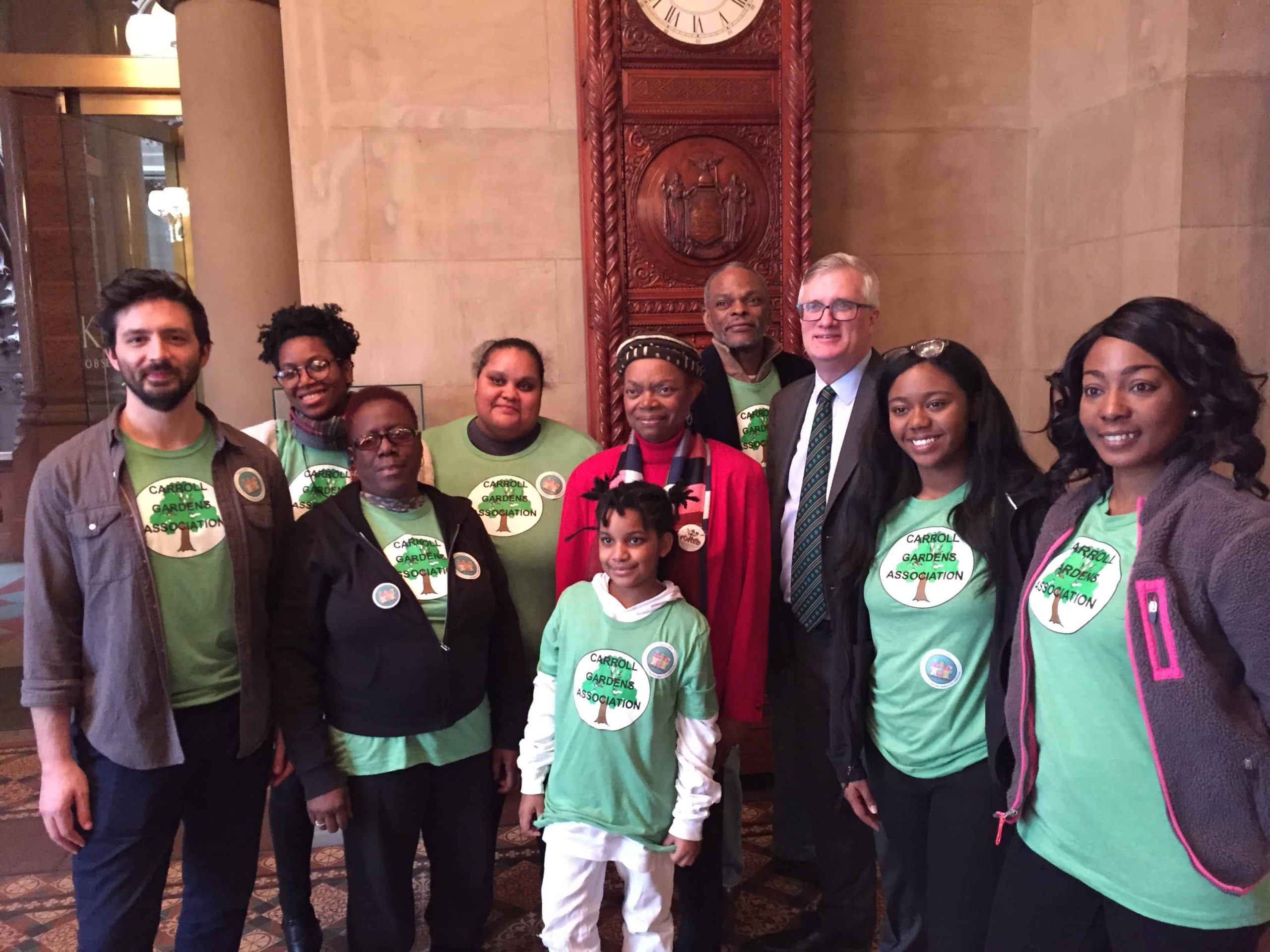
The Carroll Gardens Association (CGA) is a non-profit housing corporation that manages a number of low-income properties in Red Hook and Carroll Gardens.
On March 12 a CGA contingent took a bus up to Albany to lobby our state legislators on various housing issues.
“We usually hear from other groups how they do not perform their duties but I have never heard in my career, in 25 years, anything negative about CGA,” Assistant Speaker Felix Ortiz said in his meeting with the group.
Five CGA members and two staffers made the trip, which left CGA at 8:30 in the morning. Two tenants, Paulette Coston and Gail Johnson, made the trip last year, but it was the first time for the others.
Among the five that went up in the van was a member of the Southwest Brooklyn Tenant Union, two domestic workers advocating for their rights, and two CGA tenants.
The group was advocating to get their State Senators, Velmanette Montgomery and Brian Kavanagh, and Assistant Speaker Felix Ortiz, to increase the funding for Neighborhood Preservation Coalitions (NPC) from $12 million to $21 million, so that more money will be funneled to CGA for their programs.
According to Ben Fuller-Googins, CGA programming and planning director, the NPCs will likely find out by the end of March if they are awarded the extra $9 million. This extra funding would allow CGA to get $100,000 for programming.
Other issues of concern included affordable housing, rent stabilization and domestic worker conditions. Fuller-Googins helped found a local worker cooperative for domestic workers.
When arriving at the government capital building, everyone went through security and heard a brief welcoming on the importance of NPCs and how valuable they are. The group then went up to room 729A for their first meeting—Assistant Speaker Felix Ortiz at 1:00 p.m.
Ortiz has been working with them in some form or another since 1995. He wants to continue to provide CGA with as many resources as possible.
Ortiz, who is on the land use committee in the Assembly, has fought for affordable housing for a long time.
“This is crunch time in Albany to fight for what is needed,” Ortiz said. “I allocated $700 million for affordable housing.”
Ortiz told the CGA members and staff that he wants to protect as many marginalized people as possible.
“My job is to ensure we protect the children and seniors,” Ortiz added.
Jessica Vazquez came up to Albany to advocate for affordable housing. She recognizes that there isn’t enough affordable housing for low income and middle-class residents.
“I know you do a lot of work in Red Hook, I have seen you in events and at schools,” Vazquez told Ortiz. “We want more funding for CGA, which I am currently attending. I got on board to fight for affordable housing.”
Two domestic worker advocates made the voyage up to Albany.
Kayla Forbes was a summer intern at CGA in 2017 and was able to work with domestic workers. She is aware how much the funding is important for them.
CGA let domestic workers know their rights and help them in any way they can,” Forbes told Ortiz. “Without the funding they would not be able to do that. That is why we are here.”
Johnson, who is one of the members who went on the lobbying trip last year, thanked Ortiz for last year’s experience and remarked that it was warm and welcoming.
She is able to assist and train nannies partly due to funding through CGA.
“I am a domestic worker,” Johnson told Ortiz. “I organize and assist nannies who come to do training and learn about their rights and educate them in the field, so they can better provide for people in the community.”
Johnson was one of the first people to be employed through the worker’s co-op. She sees the co-op as empowering and appreciates CGA’s role in its founding.
“We would like for you to continue funding CGA,” Johnson told Ortiz. “They are no jokers, are doing a very great job and because of them we as domestic workers can move forward and can better serve the community.”
Johnson ended her remarks by thanking Ortiz once again since she remembers that he listened to her story and another domestic workers’ story last year.
Allen Miller, who found out about CGA because Fuller-Goggins was doing work in his building, was up lobbying in Albany for the first time. He became a member of CGA because of his involvement with the Southwest Brooklyn Tenant Union.
“I am here to support CGA for their funding request,” Miller said. “They helped reinvigorate the tenants’ union in my building. From there we expanded out into the southwest portion of Brooklyn.”
He added that he was up lobbying to support CGA because the association has been a big help for him and his building.
Coston, who was in Albany for the second year in a row, was living in Red Hook and got a chance to live at 63 Tiffany Place, which is very close to CGA’s office. She brought her son to this affordable apartment.
Her new landlord eventually took away her affordable housing paperwork from her..
“I didn’t know where to go and then found CGA,” Coston said. “I told them my story and they helped me out. They got me a lawyer. They helped me out because I didn’t know where to go. I needed CGA to help.”
Ortiz always takes CGA seriously because of the good they do for the community.
“Through the budget process I always try to make sure that this organization gets what they deserve,” Ortiz said. “Adding other components that sometimes get ignored by other people is critical for me.”
“This week and next week is crunch time in here where every single one of us is trying to fight for what is needed for our own community,” Ortiz said. “As Assistant Speaker, I listen to every member as well as listen to my constituents and to people around the state about their issues and concerns.”
Ortiz claimed that he has allocated $700 million for affordable housing.
He has a problem with the terms affordable and low income. He prefers to target low income folks and deal with affordable later.
During a break in the action between meetings with representative’s members of CGA saw other groups who were also from Brooklyn. The groups were United Neighbors Organization (UNO) and Families United for Racial Economic Equality (FUREE).
After having lunch in the food court, it was time to go through security again and upstairs to the older portion of the capital building.
Everyone had a chance to tell their stories again to Senator Velmanette Montgomery. Coston asked Montgomery to get legislation to improve the way landlords treat tenants, so her problems will not re-occur.
Miller brought up the issue of rent stabilization laws and asked Montgomery what she can do to prevent the rents from going up.
There was also a chance to hear from Senator Kavanaugh, who recently replaced Daniel Squadron. Montgomery and Kavanugh both had high praise for CGA and they spoke about how they will continue to give their support.









